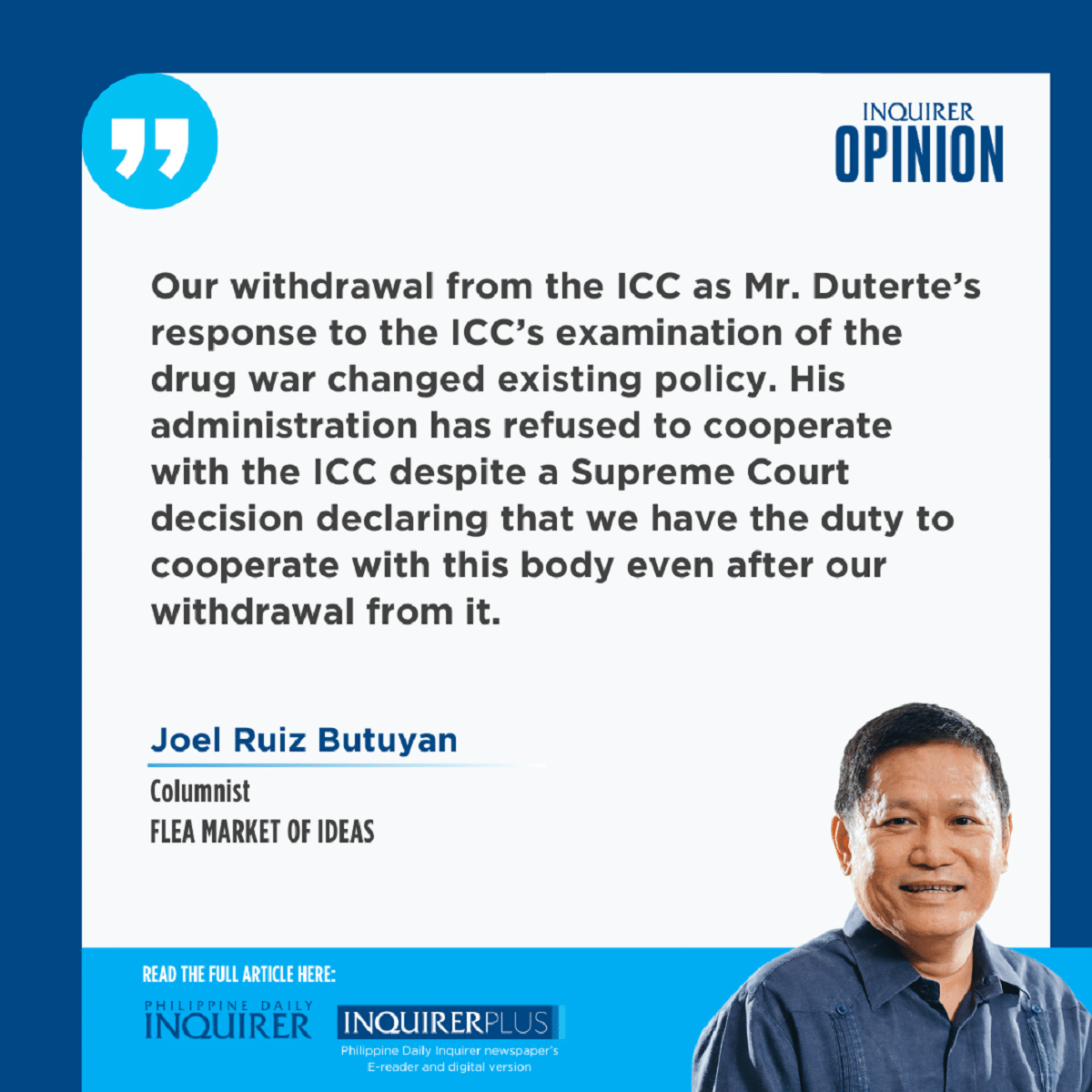Is our ICC case dependent on insider witnesses?

In a significant development, the International Criminal Court’s (ICC) Office of the Prosecutor (OTP) has publicly come out soliciting direct witnesses to “come forward and speak with us” in connection with its ongoing investigation on the Philippines. The investigation focuses on crimes committed as part of former president Duterte’s war on drugs from 2011 to 2019.
The OTP has created a website where witnesses can confidentially volunteer information and give their contact details. It is very telling that four of the five categories of “direct witnesses” being sought are “current and former” security officers and government officials. The five categories are: police officers; drug enforcement agency officers; National Bureau of Investigation officers; barangay, city, or municipal official, and government official, legislator, or member of the judiciary.
The OTP is looking into “crimes against humanity” (CAH) which may have been perpetrated by those who masterminded and ordered the commission of any of 11 underlying crimes in a widespread and systematic manner. These include murder, wrongful imprisonment, torture, and persecution.
Essentially, the OTP has two key tasks. First, it must preselect a sampling of the thousands of murder, wrongful imprisonment and other underlying crimes that it will present to prove the widespread and systematic nature of CAH during the drug war. Second, it must come up with evidence showing that all the underlying crimes are connected to each other because they were part of a plan, policy, or orchestration. The OTP must show that the underlying crimes were employed as solutions to the drug problem.
The most obvious way to prove planning or orchestration is to present “insider witnesses” who will testify that, indeed, identifiable individuals came together and came up with a nationwide plan to kill, imprison, or torture drug suspects. This explains the four categories of witnesses being sought.
But is orchestration provable only with the use of “insider witnesses”? Will the ICC’s efforts to exact accountability be entirely dependent on the willingness to testify of security officers and public officials like retired colonels Royina Garma, Edilberto Leonardo, and Jovie Espenido? Thankfully, there are other categories of evidence that can be used to prove planning and orchestration.
First, there are the many statements of Duterte and his minions, proving that there was a policy to employ killing, imprisonment, etc. as solutions to the drug problem. Then there are the many threats issued by Duterte, telling drug personalities to change or he will have them killed. There are also his multiple declarations encouraging police officers to kill drug personalities and assuring them of protection, and his statements threatening violence against human rights advocates who defend drug suspects.
In a Senate hearing, the former president confessed that he had instructed police officers to “encourage” drug suspects to fight back, so that cops would have an excuse to kill them.
Second, there’s very strong evidence of the widespread failure, or refusal by the Duterte government, to investigate reported irregularities in anti-drug raids and thousands of buy-bust operations that resulted in deaths and other crimes. The Duterte administration virtually closed its eyes and refused to initiate meaningful investigation into the tens of thousands of vigilante killings.
Third, there’s substantial evidence showing that the Duterte government reversed or violated long-standing policies, laws, regulations, jurisprudence, and treaty obligations meant to protect human rights. Those changes were calibrated to give way to new “solutions” employed to solve the drug problem. Command Memorandum Circular No. 16-2016, which instituted “Oplan Tokhang,” has provisions that violated our Constitution’s bill of rights, the rules on search and arrest, the special treatment of children, among others. The strict rules on buy-bust operations were disregarded on a massive scale. There was also the rampant violation of a police regulation requiring cops to submit themselves to inquest procedures before prosecutors when death results from their buy-bust operations.
Our withdrawal from the ICC as Mr. Duterte’s response to the ICC’s examination of the drug war changed existing policy. His administration has refused to cooperate with the ICC despite a Supreme Court decision declaring that we have the duty to cooperate with this body even after our withdrawal from it.
The masterminds of the violent drug war were loquacious, reckless, and openly defiant. They left footprints and fingerprints that identify them as the brains and implementers of a plan to use killing and other crimes as nationwide solutions to our drug problem. They can be unmasked with or without insider witnesses.
—————-
Comments to fleamarketofideas@gmail.com
















